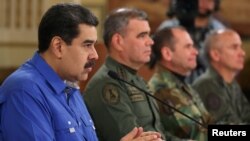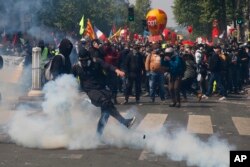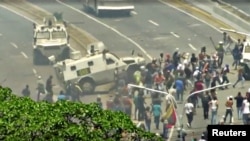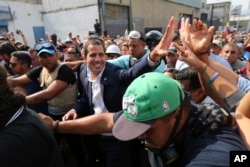Venezuelan President Nicolas Maduro and Juan Guaido, his chief political opponent who declared himself interim president, are set to hold competing May Day rallies Wednesday as both men engage in an escalating battle for control of the economically wrecked country.
The rallies are being held in the aftermath of violent street protests in the capital, Caracas, after the U.S. backed Guaido called for the military to reject Maduro's rule and switch sides in a campaign he called "Operation Freedom." Guaido appeared alongside opposition politician Leopoldo Lopez who had been put under house arrest by Maduro, but said he had been "freed" by soldiers supporting Guaido.
Lopez posted a picture of men in uniform on Twitter, with the message, "Venezuela: the definitive phase to end the usurpation, Operation Liberty, has begun." But Lopez and his family later entered the Chilean Embassy to seek refuge, then moved to the Spanish Embassy.
Thousands of demonstrators took to the streets, with gunfire erupting and troops loyal to Maduro firing water cannons at protesters.
Television footage showed one Venezuela National Guard vehicle running over demonstrators who were throwing rocks at the military. The government said one of its soldiers was hit by a bullet.
The day ended without any sign of defections within the military's top ranks from Maduro to Guaido. But Guaido, the leader of the opposition-dominated National Assembly, appeared undaunted in a video message posted on social media late Tuesday, vowing to keep up the pressure on the embattled Maduro.
For his part, Maduro claimed victory over the uprising, which he described as a coup backed by the United States, and vowed to launch criminal prosecutions against those who orchestrated the unrest.
The president also ridiculed claims made by U.S. Secretary of State Mike Pompeo that Maduro had been prepared to depart Venezuela for Havana on Tuesday morning but was talked out of it by the Russians.
Despite widespread food and medical shortages and a failing economy in Venezuela, the socialist Maduro regime has clung to power with the support of most of the country's military. Venezuela's two biggest creditors, Russia and China, also have continued to support Maduro.
Meanwhile, the United States, one of about 50 countries that has recognized Guaido as the country's legitimate leader, has imposed sanctions on Caracas in an effort to curb its international oil sales.
Guaido invoked the constitution to declare himself interim president in January after calling Maduro's leadership illegitimate because of election fraud.
In a related development, the U.S. Federal Aviation Administration issued an order late Tuesday banning all U.S. airlines from flying in Venezuela's airspace below 7,000 meters until further notice, citing "increasing political instability and tensions." The FAA also ordered all air operators in Venezuela, including private jets, to leave the country within 48 hours.









